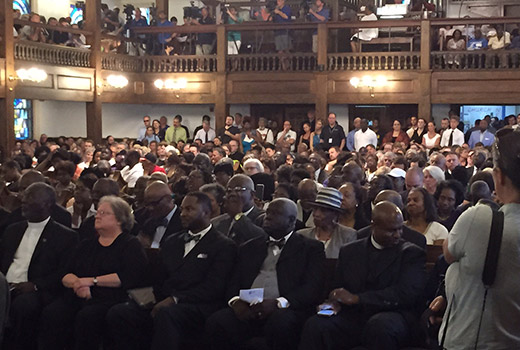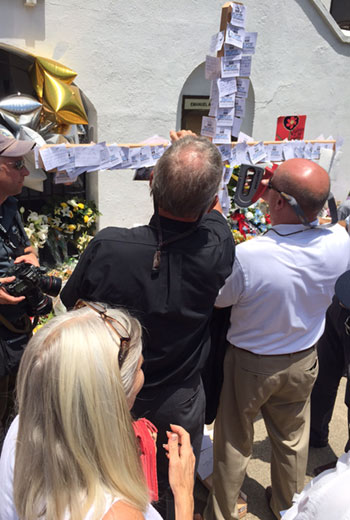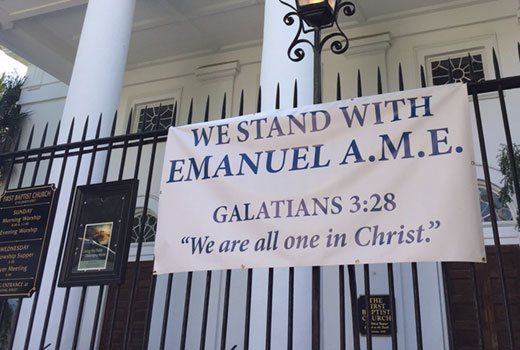By Rudy Gray and Butch Blume
The TV news trucks have packed up and moved on, but the story that exploded on the American conscience June 17 when a 21-year-old white supremacist murdered nine black Christians at Charleston’s historic Emanuel AME Church is far from over.
Long after the media spotlight has faded, what will be remembered is that the victims’ families forgave their loved ones’ killer, and the people of Charleston reacted not with furor but with reserve. The citizens of Charleston rallied in unity, blunting the assailant’s stated wish that his act might ignite a race war.
What confessed killer Dylann Roof discovered was that the hate and evil he unleashed was met by real-world Christians who chose to respond with love and forgiveness instead of hate.
“A lot of people expected us to do something strange and break out in a riot,” said Rev. Norvell Goff, who is in charge of the Edisto AME district. “Well, they just don’t know us.”
Members of Emanuel Church said they were “bent but not broken” and determined not to “let hate win.”

Faith leaders, elected officials and Charleston citizens came together June 18 at Morris Brown AME Church for a prayer service.
Churches across denominational lines joined together in a show of support for “Mother Emanuel” Church.
David Walker, pastor of neighboring Citadel Square Baptist Church, said that while the killer “came in to bring division, [he] instead has really brought unity, and that’s what we’re praying will continue.”
Charleston First Baptist Church pastor Marshall Blalock said that “God, in his goodness and sovereignty, has inspired these families to magnify the blessing of grace and prevailing love in the midst of what was intended for evil.”
The beauty and power of the Gospel was on display at the suspect’s bond hearing, Blalock said, where “black lay Christians from Emanuel AME Church gave the greatest Gospel witness in the history of our city. One after another, families forgave the man who killed their loved ones and even called on him to repent and receive Christ as his Savior.”
Blalock said the grace displayed by the families has created a “Gospel conversation” throughout the city.
On the Sunday after the Wednesday-night prayer meeting massacre, a walk across the Arthur Ravenel Bridge — designed as a display of solidarity — turned into a celebration of unity, faith and hope. Organizers anticipated 3,000, but police estimated the crowd to be well over 10,000.
As the tragedy unfolded, South Carolina Baptists were exhorted by convention president Tommy Kelly to pray for the victims’ families. Kelly called for a “unified prayer effort of all people,” and SCBC executive director-treasurer Richard Harris pledged the state convention’s assistance “in any way possible.” The following day, the convention donated $25,000 to Emanuel Church to help with funeral expenses for the families, and Charleston First Baptist Church donated $2,000.
Other donations soon followed. Jerry Richardson, owner of the Carolina Panthers NFL football team, sent $100,000, and NewSpring Church, which has multiple campuses across South Carolina, received a collective love offering of $361,000.
Three Southern Baptist churches in Charleston (Awaken, Journey and Centerpoint) suspended their regular Sunday services and came together for worship in sweltering heat on Marion Square, conveying to Emanuel their love and support.
On June 30, more than 100 pastors, black and white, came together at Citadel Square Baptist Church “to pray and seek out relationships with one another,” according to Craig Tuck, a Baptist church planter in Charleston and a community advocate for racial reconciliation and multiethnic worship and evangelism. He said many of the participants “repented of prejudice and discrimination [that have] kept them from coming to the table together for relationships.”

The congregation of Charleston First Baptist Church placed messages on a cross and, with members from other downtown churches, carried it to the front of Emanuel AME Church.
The next day, a multiethnic prayer gathering was held at Charleston’s First Baptist Church. “Pastor Marshall Blalock addressed the congregants and shared the history of slave members of First Baptist,” said Tuck, who is pastor of Centerpoint Church of North Charleston. “He noted the Old Testament Scriptures and referenced sins that impact lives for generations following … and called us to repentance and reconciliation through Gospel grace.”
What followed was “nothing short of remarkable,” Tuck said. “Black pastors took seats on the platform, and white pastors got on their knees and washed their feet. This was reciprocated by the black pastors as a testimony of forgiveness in the Gospel.”
“There’s always the work of the Holy Spirit that has to sustain movements like this,” Tuck later told World Magazine. “Our intentions are to come together at least in conversation and dialogue,” something he acknowledged has been happening in the community “in different ways, but not consistently.”
K. Marshall Williams, president of the National African American Fellowship of the Southern Baptist Convention, said it is “time for the Body of Christ to unify, to accelerate and enhance transparent dialogue and deliberate execution of biblical mandates that will usher in a Greatest Commandment revival in the Church and a spiritual awakening in this sin-sick, secular society.”
The Charleston massacre occurred hours after the conclusion of the Southern Baptist Convention 2015 annual meeting in Columbus, Ohio, where SBC president Ronnie Floyd led messengers and others in a prayer meeting for spiritual awakening and revival, and the SBC marked 20 years of progress in race relations since its historic 1995 resolution on racial reconciliation.
From the editor:
An act of racist hate could have exploded into confusion and violence, but the light from Charleston has shone brighter than the media light that has been on the city.
Our nation can say to Charleston, with deep gratitude, “Thank you for showing us the better way.” The light that is shining from the “Holy City,” so named because of its many churches, touches us all. In this struggle between love and hate, love won. We have seen the power and truth of God in action — not in times of ease, but in a time of great tragedy. An evil darkness has providentially become the backdrop for God’s light to shine even more brightly.
As our state mourns this great injustice and prays for the families of the deceased, we are also encouraged by the testimony of God’s people. There is a light in Charleston that shines brightly.
— With reporting from Diana Chandler for Baptist Press.
